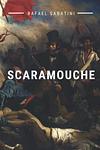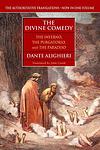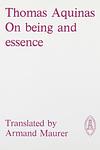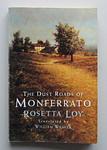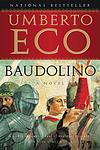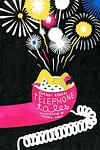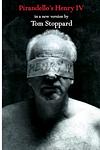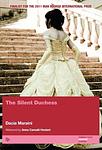The Greatest Italian Books of All Time
Click to learn how this list is calculated.
This list represents a comprehensive and trusted collection of the greatest books. Developed through a specialized algorithm, it brings together 284 'best of' book lists to form a definitive guide to the world's most acclaimed books. For those interested in how these books are chosen, additional details can be found on the rankings page.
Genres
Countries
Date Range
Reading Statistics
Click the button below to see how many of these books you've read!
Download
If you're interested in downloading this list as a CSV file for use in a spreadsheet application, you can easily do so by clicking the button below. Please note that to ensure a manageable file size and faster download, the CSV will include details for only the first 500 books.
Download-
76. Troubling Love by Elena Ferrante
This novel follows a woman who returns to Naples after her mother's mysterious death, determined to understand the enigmatic life her mother led. As she delves into her mother's past, she uncovers a web of secrets and discovers more about her own identity in the process. The narrative explores themes of mother-daughter relationships, identity, and the power of the past.
-
77. Pereira Maintains by Antonio Tabucchi
"Pereira Maintains" is a novel set in the backdrop of 1938 Portugal during the fascist dictatorship of Antonio de Oliveira Salazar. The narrative follows Pereira, a widowed, overweight editor of the culture section of a second-rate Lisbon newspaper, who becomes politically awakened after meeting a young anti-fascist. As he grapples with his conscience, he risks everything to help his new friend and his pregnant girlfriend escape to safety. The story is a compelling exploration of the struggle for moral integrity in a climate of political oppression.
-
78. Scaramouche by Rafael Sabatini
This novel is a swashbuckling tale set during the French Revolution, revolving around the life of a young lawyer turned revolutionary, who adopts the guise of Scaramouche, a vagabond performer. After witnessing a grave injustice that affects him personally, the protagonist embarks on a journey of revenge, political activism, and personal transformation. Through his adventures, he becomes a master swordsman and a key figure in the revolutionary movement, all while navigating the complexities of love, friendship, and the quest for justice. The story is a rich tapestry of action, romance, and historical intrigue, exploring themes of identity, revenge, and the quest for equality.
-
79. Arturo's Island by Elsa Morante
This novel unfolds on a remote island in the Gulf of Naples, where the young protagonist, Arturo, lives a solitary life steeped in the wild beauty of his surroundings. His existence is dramatically transformed with the arrival of his father's new wife, igniting a complex web of emotions and a tumultuous journey of self-discovery. Through Arturo's eyes, the narrative explores themes of isolation, the search for identity, and the painful awakening to the realities of adulthood, set against the backdrop of a rugged island landscape that mirrors the turbulent inner world of its inhabitants. The story is a poignant exploration of the bonds that tie us to our families and the inevitable loss of innocence, rendered with a lyrical intensity that captures the essence of youth and the stark beauty of the natural world.
-
80. The Little World Of Don Camillo by Giovanni Guareschi
This book is a charming collection of stories set in a small village in post-World War II Italy, where the local priest, Don Camillo, and the communist mayor, Peppone, are constantly at odds. Despite their political and ideological differences, they share a deep, if grudging, respect for each other, often collaborating for the good of their community. The tales are infused with humor, warmth, and a touch of the supernatural, as Don Camillo has conversations with the crucifix in his church, seeking guidance and solace. Through these engaging narratives, the book explores themes of friendship, faith, and the importance of finding common ground amidst conflict.
-
81. The Montessori Method by Maria Montessori
The book provides an in-depth exploration of the educational method developed by the author for teaching children. It emphasizes the importance of self-directed activity, hands-on learning, and collaborative play in child development. The book also discusses the author's philosophy of observing children in a "prepared environment" where they have access to materials and experiences to aid their learning. The method encourages children to make creative choices in their learning, while the teacher guides the process. The book also delves into the author's belief in the critical importance of the early years of a child's life in shaping their future development.
-
82. The Future Of Democracy by Norberto Bobbio
In "The Future of Democracy," the author provides a critical examination of the concept and practice of democracy, exploring its historical evolution, inherent challenges, and potential future. The work delves into the tension between the ideals of democracy and the practical realities of governing, addressing issues such as the role of political parties, the influence of public opinion, and the impact of economic inequalities. The author argues for the necessity of continuous democratic reform and the importance of safeguarding democratic principles in the face of changing social and political landscapes, ultimately presenting a thoughtful reflection on the prospects and resilience of democratic systems in the modern world.
-
83. The Conformist by Alberto Moravia
The novel explores the life and psyche of a government official during the 1930s Fascist Italy, who is driven by a desire to belong and be considered "normal" at any cost. Tormented by his own perceived abnormality and a traumatic past, he becomes obsessed with conforming to the societal norms dictated by the fascist regime. In an attempt to prove his allegiance and suppress his own feelings of inadequacy, he agrees to carry out a political assassination. The narrative delves deep into themes of identity, the nature of conformity, and the moral compromises made by individuals under oppressive political systems.
-
84. The Inferno by Dante Alighieri
The book is an epic poem that takes the reader on a profound journey through the nine circles of Hell, guided by the ancient Roman poet Virgil. The narrative follows the author's alter ego as he embarks on a quest for salvation, encountering the souls of the damned and witnessing the divine justice meted out for their earthly sins. The vivid and often harrowing depictions of the torments suffered by the inhabitants of the underworld serve as an allegory for the spiritual trials that individuals must overcome. This journey is not only a personal one but also represents the soul's path towards God, exploring themes of morality, redemption, and the nature of sin.
-
85. On Being And Essence by Thomas Aquinas
"On Being and Essence" is a philosophical treatise that delves into the complex concepts of essence and existence, primarily focusing on the distinctions and relations between the two within the context of Scholastic metaphysics. The work systematically explores how substances are composed of essence and existence, how these components relate to each other, and how they contribute to an entity's being. The treatise also examines the attributes of different beings, particularly distinguishing between material and immaterial substances, and discusses the implications of these distinctions for understanding the nature of reality and the existence of God. Through rigorous analysis, the text seeks to provide a foundational understanding of metaphysical structures, which underpin the scholastic theological and philosophical tradition.
-
86. All Our Yesterdays by Natalia Ginzburg
"All Our Yesterdays" is a poignant narrative that delves into the lives of an Italian family and their acquaintances, set against the backdrop of Fascism and World War II. The story explores the complex web of relationships, personal struggles, and societal changes as the characters navigate love, loss, and the impact of political turmoil. Through a series of interconnected tales, the novel paints a vivid portrait of the human condition, highlighting the resilience of the spirit amidst the ravages of war and the passage of time.
-
87. I'm Not Scared by Niccolò Ammaniti
Set in a small Italian village during the scorching summer of 1978, this novel tells the story of a 9-year-old boy who discovers a horrific crime being hidden by the adults in his community. The boy, while exploring an abandoned farmhouse, stumbles upon a young boy being held captive in a hole. As he tries to help the captive boy, he is forced to face the moral complexities of his world and the terrifying realization that his own father might be involved in this cruel act. The story is a poignant exploration of innocence, friendship and the loss thereof, and the harsh realities of adulthood.
-
88. The Servant Of Two Masters by Carlo Goldoni
The play is a classic Italian comedy that revolves around the clever and resourceful Truffaldino, who seeks to serve two different masters simultaneously in the hope of doubling his income. The ensuing plot is a whirlwind of mistaken identities, love triangles, and comedic confusions. As Truffaldino scrambles to keep his dual employment a secret, the characters are entangled in a series of humorous situations involving love-struck young lovers, a feisty soubrette, and a pair of stern fathers. The play culminates in a series of revelations and reconciliations that restore social order and conclude with festive celebrations.
-
89. The Dust Roads Of Monferrato by Rosetta Loy
Set against the backdrop of rural Italy, the novel weaves a rich tapestry of family saga and historical transformation. It follows the lives of several generations of a family in the Monferrato region, as they navigate the tumultuous changes of the 20th century. Through wars, social upheaval, and personal trials, the characters' stories intertwine with the dusty roads of their homeland, painting a vivid portrait of a community bound by tradition yet facing the inevitable march of progress. The narrative delves into themes of memory, identity, and the enduring impact of the past on the present, all while celebrating the beauty and resilience of the Italian countryside.
-
90. Survival In Auschwitz by Primo Levi
This book is a harrowing, first-person account of a man's year-long ordeal in Auschwitz, the infamous Nazi concentration camp. The narrative details the brutal conditions, the dehumanizing treatment, and the constant struggle for survival. Despite the horrors he faces, the author emphasizes the importance of maintaining one's humanity and dignity, even in the face of unimaginable cruelty. The book serves as a poignant reminder of the depths of human depravity, as well as the resilience of the human spirit.
-
91. Baudolino by Umberto Eco
Set in the 12th century, the novel follows Baudolino, a self-proclaimed liar and adventurer, as he travels from his home in Italy to the mythical kingdom of Prester John. Along the way, he becomes embroiled in a series of political and religious intrigues, meets a variety of fantastical creatures, and tells a series of increasingly elaborate lies. The narrative is framed as a story Baudolino is telling to a Byzantine historian, adding another layer of unreliability to his already questionable narrative.
-
92. Il Colombre by Dino Buzzati
The book is a collection of short stories that blend the ordinary with the extraordinary, creating a world where the fantastical becomes possible. The titular story revolves around a young boy who is pursued by a mythical sea creature, the Colombre, which is believed to bring doom. However, as the boy grows into a man, he learns that the creature's intentions may not be as malevolent as they seem, and the pursuit may actually be a call to embrace his destiny. The narrative is a poignant exploration of fear, destiny, and the unknown, showcasing the author's skill in weaving magical realism with human emotion.
-
93. Il Mestiere Di Vivere by Cesare Pavese
The book is a deeply personal diary that chronicles the inner life of its author, a prominent Italian writer, over a period of more than a decade. It offers a raw and intimate glimpse into his thoughts, daily experiences, and struggles with existential questions, relationships, and his own creative process. The diary entries reflect on themes of solitude, despair, and the search for meaning, as well as the author's observations on literature, politics, and the human condition. The work is renowned for its literary introspection and the poignant exploration of the challenges inherent in the "craft of living."
-
94. Telephone Tales by Gianni Rodari
This enchanting collection of stories revolves around a father who, due to his job requiring constant travel, tells his daughter nightly tales over the phone. Each story transports the listener to whimsical places and introduces a cast of imaginative characters, blending humor, fantasy, and insightful observations about life. The tales, rich in creativity and wit, not only strengthen the bond between the father and daughter but also celebrate the power of storytelling to connect and inspire. Through these phone conversations, the book underscores the importance of imagination and the joy of sharing stories, making it a delightful read for both children and adults.
-
95. Henry Iv by Luigi Pirandello
In this novel, the protagonist is a man who, after an accident during a historical pageant, comes to believe himself to be the medieval German emperor Henry IV. For twenty years, he lives in a villa with attendants who indulge his delusion. The story delves into themes of madness, reality, and illusion as characters from his past attempt to cure him, leading to a complex examination of the nature of sanity and the role that personal mythologies play in our lives. As the line between the protagonist's delusion and the reality of those around him blurs, the narrative raises profound questions about the nature of identity and the masks people wear in society.
-
96. The Silent Duchess by Dacia Maraini
This novel is a poignant exploration of the life of an 18th-century Sicilian noblewoman, born into privilege yet silenced by a congenital disability. Through her eyes, readers experience the constraints and expectations placed on women of her time, navigating a world where her voice is metaphorically and literally stifed. Despite the limitations imposed by her society and her own family, she embarks on a journey of self-discovery and defiance, seeking love, intellectual fulfillment, and a sense of identity within the opulent yet oppressive confines of her aristocratic life. The narrative delves into themes of power, gender, and the quest for personal freedom, painting a vivid picture of historical Sicily and the resilience of the human spirit.
-
97. The Flame Of Life by Gabriele D'Annunzio
"The Flame of Life" is a novel that delves into the passionate and tumultuous affair between a famous writer and a Venetian noblewoman. Set against the backdrop of early 20th-century Venice, the narrative explores themes of love, art, and the quest for immortality through creation. The protagonist's obsession with leaving a lasting legacy is mirrored in the intense and consuming relationship he shares with his lover, making the city of Venice a central character in their story. The novel is rich in symbolic imagery and poetic language, reflecting the author's fascination with beauty, decadence, and the complexities of the human soul.
-
98. Equal Danger by Leonardo Sciascia
In a society where political corruption and disillusionment are rampant, a series of murders targeting high-ranking officials sends shockwaves through the establishment. A detective, known for his intelligence and integrity, is assigned to the case, only to find himself entangled in a web of intrigue that blurs the lines between justice and power. As he delves deeper into the investigation, he confronts the existential absurdity of a system that seems to protect the very forces it should be fighting against, leading to a climactic resolution that questions the very nature of truth and the role of law in a flawed society.
-
99. As A Man Grows Older by Italo Svevo
The novel delves into the life of an aging, unremarkable bureaucrat who becomes entangled in a love affair with a much younger woman. As he grapples with his fading youth and the disappointments of his mediocre career, his romantic aspirations lead to a series of comic and poignant misadventures. The narrative explores themes of self-deception, the disillusionment of middle age, and the human struggle to find meaning and connection in a modern world that often seems indifferent to individual desires and fears.
-
100. T Zero by Italo Calvino
"T Zero" is a collection of complex, imaginative stories that blend scientific concepts, mathematical structures, and literary experimentation. The work challenges the boundaries of time, space, and narrative convention, weaving together a tapestry of tales that explore the nature of reality, causality, and human perception. Through a series of thought-provoking vignettes, the book delves into the paradoxes of existence, employing a playful yet profound use of language to question the very framework of storytelling and the universe it attempts to describe.
Reading Statistics
Click the button below to see how many of these books you've read!
Download
If you're interested in downloading this list as a CSV file for use in a spreadsheet application, you can easily do so by clicking the button below. Please note that to ensure a manageable file size and faster download, the CSV will include details for only the first 500 books.
Download

